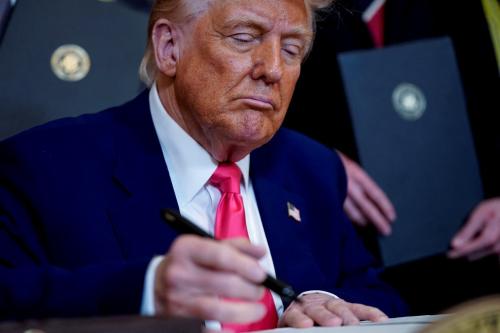Newsday published an abbreviated version of this testimony on March 29, 2000.
Mr. Chairman:
I would like to thank you and your colleagues for the opportunity to appear before this committee. The bulk of my statement will focus on national security aspects of energy, especially as they relate to matters of price and supply of oil.
Let us be clear on why we are meeting here today. It is because of the large and relatively sudden surge in oil prices, from just over $10 a barrel little more than a year ago to around $30 today. This has translated into a dramatic increase in retail gasoline prices, from less than $1 a gallon throughout most of the United States to more than $1.50. In many cases, these increases have caused real hardship for both individuals and businesses.
I mention all this at the outset of my statement because it is important not to confuse higher oil prices with high oil prices. Recent prices, while obviously higher, are not particularly high by historical standards, especially when they are adjusted for inflation. In real terms, and despite recent increases, today’s energy prices are no higher (and, compared to some years, are actually lower) than they were over the past nearly three decades and in the early 1980s in particular.
It is important, too, to keep in mind that one reason prices are so much higher today than they were only 12 months ago is that the price then had fallen to a level that represented a modern nadir. A number of factors accounted for that situation, including the Asian economic crisis and resulting falling of demand for oil, warmer weather patterns, and increases in oil output from a number of producing states, including but not limited to OPEC members. Not surprisingly, it was a change in a number of these same factors—above all, in the revival of Asian economies and the implementation of the decision by OPEC oil ministers meeting in March 1999 to reduce oil output by some two million barrels a day—that brought about a different supply/demand balance in the world and triggered the higher prices.
But do higher prices constitute a national security problem? Within limits—and we are nowhere near such limits—I would suggest not. This is not to say that higher energy prices are without impact, be it at a macro level on inflation or at a micro level in complicating the balance sheet of businesses or the budgets of families. But today’s prices in and of themselves do not threaten American or global prosperity. Indeed, what is normally more important than the specific price of oil is price stability and predictability. Both are needed for planning and budgeting.
This conclusion has several consequences for policy. First, it suggests that use of the Strategic Petroleum Reserve would not be warranted under current circumstances. The SPR ought to be reserved to deal with true supply crises, not price-related problems. Second, the United States should engage in regular consultations with OPEC producers, who collectively account for some 40% of the oil produced in the world. Such talks cannot determine what might be described as market fundamentals—technology and larger economic trends will account for these—but they can prove useful in dealing with major market fluctuations such as those we have seen over the past year.
Implicit in this suggestion is an acceptance of the notion that low prices per se should not be a goal of American energy policy. I say this for reasons that go beyond the adverse impact of low prices on American businesses and communities that depend on income from oil production or from the reality that low prices encourage consumption with all that does to worsen the balance of payments and the environment. Low prices also discourage exploration and production, which over time all but guarantees supply shortages and higher prices. In addition, low prices, such as existed a year ago, cause great economic, social, and political hardship for producer countries, including Mexico and Saudi Arabia, whose stability is arguably a vital national interest of the United States.
In this regard, I would also advise that the Senate reject the notion being put forward in the House of Representatives that the United States threaten sanctions (reducing or cutting off economic and military assistance) against those producers who join to constraint output. Such sanctions would in many cases be redundant, in that a good many U.S. economic sanctions already target countries that happen to produce energy. But what is more, such a confrontational approach would be inconsistent with the reality that we need to cooperate with many of these same governments on a range of national security and economic undertakings ranging from efforts to counter the flow of drugs and weapons of mass destruction to the need to promote their ability to work with us against internal and external challenges to their security.
This last point leads naturally to another, namely, that today’s understandable focus on price should not obscure what is arguably the more important consideration (from the national security perspective) of supply. What matters is that there is enough oil available to meet the bulk of the world’s demand. It is not simply that the United States now imports more than half the oil it consumes daily, but also that the U.S. economy could not prosper amidst a world recession, something that would be triggered by a shortage of supply even if U.S. import needs were somehow met. In the end, there is only one global oil market; major supply shortages from any source will affect us all.
There is no single answer or solution to this challenge. The policy response cuts across what is normally seen as the separate spheres of foreign and defense policy, economic policy and domestic policy, and involves such matters as maintaining and tapping strategic reserves, encouraging conservation, diversification of energy sources, multiplication of oil producers, progress on the Arab-Israeli front, international sharing or pooling arrangements, adequate military preparations, and encouraging producers to undertake needed social, political and economic reforms so as to make domestic challenges less likely.
Somewhat more specifically, this interest places a premium on the stability of the Persian Gulf area, home to approximately two-thirds of the world’s proven oil reserves, and to Saudi Arabia in particular, for now and the foreseeable future the world’s single largest producer of oil. This in turn argues for continued efforts to weaken—and ultimately change—the Iraqi regime, the greatest threat to that region’s stability. It also suggests the need to reconsider current U.S. policy toward Iran, a policy that all but precludes U.S. participation in the Iranian oil industry. Concerns over Iranian support for terrorism and development of weapons of mass destruction are well founded, but movement in the price of oil overwhelms any impact of U.S. sanctions. U.S. oil companies are being penalized far more than the government of Iran is being constrained.
Last, let me end where I began, on the matter of price. It was just a year ago this month that The Economist ran a cover story titled “Drowning In Oil” in which it thoughtfully explained the mixed consequences of low energy prices and predicted that we had yet to see the bottom. As we know, that prediction proved incorrect. But where will price move with time? As Yogi Berra is alleged to have said, predictions are always difficult, especially about the future. What is certain is that world demand for oil is growing. But several other factors are also at work. New technologies are increasing the amount of oil that is known and can be recovered. Meanwhile, other new technologies—for example, in the automobile sector—will reduce the use of gasoline. And changing economic patterns are weakening the link between economic growth and energy consumption.
In short, no one should make predictions in this realm with any degree of confidence. Prices for oil in world markets are already more than 10% below where they were just a few weeks ago. Clearly, what is moving the price is the expectation that OPEC oil ministers will agree to boost production when they meet in a few days. Such price movements are both inevitable and acceptable, and do not raise national security problems. But it would help economic policy and smooth out foreign policy if more were done to reduce price volatility on the scale we have recently experienced.
Thank you.
The Brookings Institution is committed to quality, independence, and impact.
We are supported by a diverse array of funders. In line with our values and policies, each Brookings publication represents the sole views of its author(s).



Commentary
TestimonyEconomic and Security Implications of Oil Price Increases
March 24, 2000